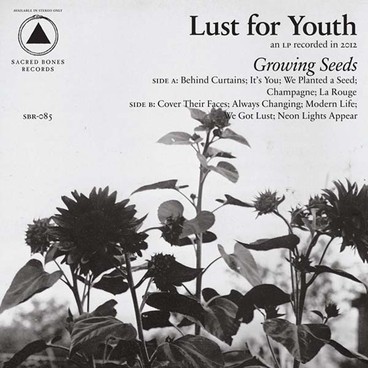If you take the two musical genres of noise and synth pop and trace them back, back through Wolf Eyes and La Roux, back through Coil and the Pet Shop Boys, all the way back to Throbbing Gristle and Cabaret Voltaire and The Normal, you reach a point where the two lines wind together and fuse. Both lines were forged in the white heat of the late ’70s, when the growing availability of synthesizer technology – either custom-built, from manuals, or in new budget-price models such as the Korg MS-10 – made analogue synthesis available not just to the caped lords of progressive rock, but to the oiks on the street.
In the last few years, a number of groups have emerged who, whether by intention or not, are working to reconcile these two paths of noise and synth-pop: former hardcore screamer Wes Eisold’s Cold Cave; Greh ‘Hive Mind’ Holger’s Pure Ground; Vår, the new project from Iceage’s Elias Bender Rønnenfelt; new London duo Natural Assembly; and Lust For Youth.
The solo project of one Hannes Norrvide, Lust For Youth debuted back in 2009 while Norrvide was living in his native Gothenburg and hanging out at Utmarken, a venue and rehearsal space frequented by local harsh noiseheads. His early releases, the likes of 2011’s Solar Flare find him wrestling with his sound, formative synth and drum machine experiments obscured and barely visible through the filth and murk. Since, he’s relocated to Copenhagen, where he’s part of the city’s unusually vibrant noise/punk/black metal/whatever scene based around the Posh Isolation label (Loke Rahbek, co-owner of Posh Isolation and member of Sexdrome and Vår now joins Norrvide as Lust For Youth’s live keyboardist). And now, his second album Growing Seeds – first released earlier this year by Italy’s Avant! Records, and now reissued by New York’s Sacred Bones with a selection of extra tracks – finds Norrvide’s sound in full bloom.
The charm of Growing Seeds is, in part, to be found in its naïvety. Norrvide approaches synth pop not as something that should be subverted or detourned, but wide-eyed and unjaded. His voice is often echo-treated, often partly submerged – he’s no Alison Moyet, that’s for sure – but his plaintive cries have a breathless, romantic yearning. On songs like ‘Behind Curtains’ and clubby standout ‘Always Changing’, the melodies are willowy and virginal, melancholy and curiously uplifting (to give you an idea, when I met Norrvide at Incubate Festival in Holland earlier this year, he told me he’d been listening to lots of Pet Shop Boys: "In my head, Lust For Youth sounds polished," he said, "but I’m not sure everyone will agree".)
Noise elements, meanwhile, aren’t just smothered on, but applied with sensitivity. ‘Modern Life”s synths take on a hard sine-wave buzz. The elegiac ‘Neon Lights Appear’ sounds like an offcut from Kraftwerk’s Computer World, suddenly invaded by a fleet of malign, helicopter-like oscillators. More muscle is shown on ‘Cover The Faces’, a leathery EBM pulse powered by metal-on-metal crashes, while ‘We Planted A Seed’ is a brooding instrumental interlude that gradually lowers a Nitzer Ebb-style synth motif into a broiling bath of crackling harsh noise. Even when playing it relatively straight, on the pulsing ‘We Got Lust’, Norrvide can’t help but subtly layering the music with a chaos of screams and yells, a barely heard altercation that is never explained, and the more unnerving for it.
The risk with creating any kind of musical hybrid is that by blending fire and ice, as Spinal Tap’s Derek Smalls might put it, you create lukewarm water. Growing Seeds works because the integrity of its parts – melody and noise, innocence and depravity, light and darkness – remain intact. I suppose the nearest touchstone for Growing Seeds might be Cold Cave’s Cremations and Love Comes Close, but LFY’s twining of noise and pop feels unstudied, and instinctual: an articulation of something intensely personal, and, in its own way, utterly fresh. Back in Tilberg, I asked Norrvide about his project’s name: a rather unsettling provocation, for an act that has left the more lumpen transgressions of the noise scene behind. "I wanted the name to have the nasty connotation," he said. "But I also wanted it to have that feeling of looking back, remembering better times. And now I think I like that feeling more."


